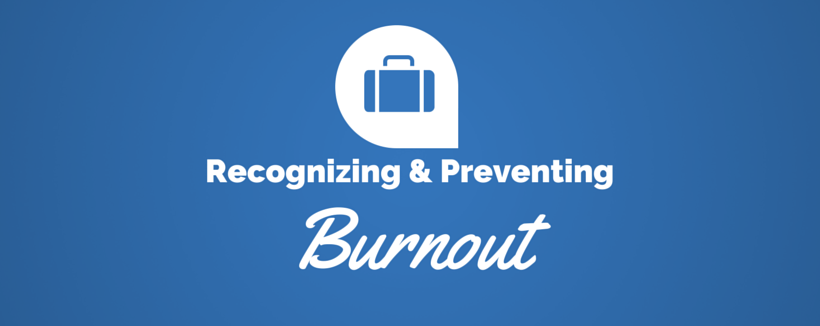
I know you’re thinking burnout is no big deal. That it’s the norm today and “I’m just stressed, it’s fine.” But maybe you’re not.
Let’s say you’re stressed from trying to prove yourself at a new position. Or your work is overwhelming in general. You probably think you have to deal with it.
The good news is that there are things you can do right now to deal with it, and prevent it in the future.
Step 1: Identify the Problem
At first, burnout may just seem like stress. Lots of stress, that is. But there’s a big difference between the two.
The New York Times puts it this way: Burnout is to stress what clinical depression is to feeling blue. Yikes.
Also, stress is short-term while burnout is long-term. So if stress controls your life, you’re likely feeling the effects of burnout.
Some common signs of burnout include:
- Feeling exhausted
- Having less motivation
- Inability to concentrate
- Inability to separate work life from home life
- Failing to take care of yourself emotionally and physically
Exhaustion can happen normally. It only becomes a problem if you’re always exhausted. Stress that keeps you up all night will make you feel constantly wiped out.
If you go to work dreading the day ahead and can’t focus on your tasks, burnout may be to blame. Caffeine and sugary drinks may help focus in the short-term, but the underlying problems are still there.
Another big symptom is work separation. With email and online software, working from home has grown 80% since 2005.
It’s no wonder people are having a hard time drawing the line between home and work life. Constant connectivity creates a huge gray area where you’re not on the clock, but still working.
This overlap may cause you to neglect emotional and physical needs. Overworking also takes time from maintaining relationships and physical activity.
You might be making unhealthy decisions because of your busy schedule. Maybe you haven’t been to the gym in months. Or you frequently choose fast food over healthy meals due to convenience.
Now if you’re anything like me, you’re going to be thinking one thing right now: “So what? I can still handle it.” But can you? These symptoms lead to some serious long-term issues, like depression and heart disease. Is working to the point of chronic stress really worth it?
If you’re still not sure if you’re feeling stress or burnout, there’s a survey you can take for more in-depth results. The Maslach Burnout Inventory has a short assessment to get an idea about where you stand. If you want a quiz you can take on-the-go, MindTools has a general assessment for burnout as well.
Step 2: Make an Effort to Improve Your Situation
Now that you know what burnout is, you can take steps to recover from it. Some ways to fix burnout are attending counselling, getting enough sleep, and unplugging from work.
We’ve touched on work/life balance suggestions for young professionals as well as executives, but here are general tips for prevention anyone can use.
Seek Outside Assistance
According to MindTools, first up is some deep self reflection.
You should be asking yourself questions like, “Why am I feeling resentment?” or, “What effects has this had on me?” This is where counselling comes in.
If your office has a mental health assistance program, you should use it. Talking to a professional helps you lay out your issues and work through them. Sometimes it takes an outsider’s perspective to really make things clear.
During your reflection, you should establish your values and new goals for a post-burnout life. Ask yourself if your job works with these long-term goals, or hinders them. If it does hinder your goals, maybe the work environment is the culprit for your chronic stress.
Keep “Work” and “Life” Separate
The next thing to do is to change some habits. For a lot of people, this means leaving work at work. A good practice to get into is limiting the number of times you check work email outside of work.
It’s hard to go cold turkey on email checks. Instead, set up times to read emails. By not being on call 24/7, you’ll have time to think about other things instead.
Letting coworkers know of these times can make you feel less obligated, as well. They won’t expect immediate responses from you outside those time slots.
Not only will this help you leave work at work, but you’ll have more time to sleep. There isn’t a “magic number” for how much sleep you need, but a general recommendation is 7-8 hours a night for adults. When you don’t wake up tired anymore, you’ll know you’ve found your sweet spot.
Use Your Time Off
Actually use your vacation days. Most people I know are guilty of wasting them. They think they’ll fall behind on work and just can’t bear to be away from the activity. But this constant “go, go, go” can increase the likelihood for burnout.
Vacation days are there for a reason. Getting away from responsibilities for a little while will let you recharge.
I’m not saying you have to take weeks off at a time. Instead, take the occasional Friday or Monday off to create long weekends. That way, you won’t be too far removed in case of problems.
Step 3: Prevent Future Burnout
Work will always have its challenges, but hopefully you’re now healthier and happier, and better prepared to deal with them.
Use the same tips whenever you start feeling too stressed again. It’s easy to fall back into old habits, but remind yourself how it felt to be burnt out. Once you remember, you’ll be motivated to keep up the new habits.
Remember, even little changes matter when it comes to dealing with stress. It’s so important to take action against your issues so you can live and feel better.
(365)
Report Post





